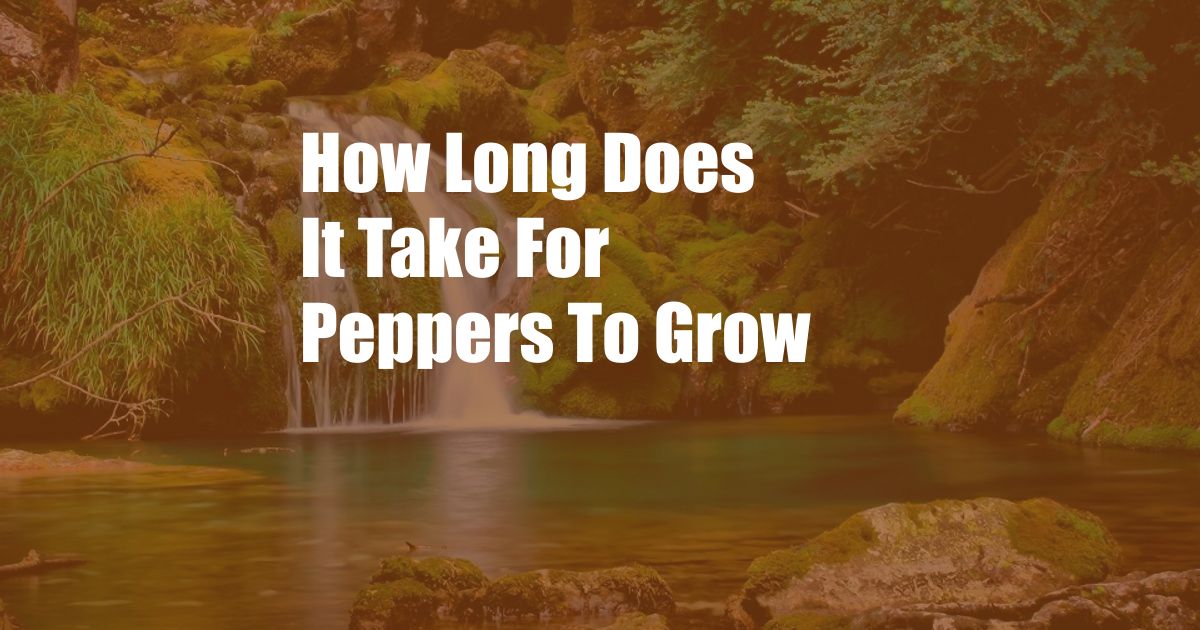
How Long Does It Take for Peppers to Grow?
I remember the first time I tried to grow peppers. I was so excited to see the little plants sprout, but I quickly realized that I had no idea what I was doing. I didn’t know how much water they needed, how much sun, or when to harvest them. As a result, my peppers were a disaster. They were small, bland, and they didn’t produce very much. I was so disappointed, but I refused to give up. I did some research and learned everything I could about growing peppers. The next year, I tried again, and this time I was successful. My peppers were big, juicy, and delicious. I was so proud of myself, and I couldn’t wait to share my newfound knowledge with others.
If you’re interested in growing your own peppers, I’m here to help. I’m going to share everything I know about how to grow peppers, from start to finish. So, whether you’re a beginner or you’ve been growing peppers for years, I hope you’ll find something useful in this blog post. Let’s get started!
The Different Stages of Pepper Growth
Just like any other plant, peppers go through multiple stages of growth, including germination, seedling growth, vegetative growth, flowering, fruiting, and ripening. Each of these stages takes a certain amount of time, and it’s important to be aware of them so you can provide your plants with the care they need at each stage.
Germination
The first stage of growth is germination. This is when the seed absorbs water and begins to grow. The germination time for peppers is typically 7-14 days. During this time, it’s important to keep the seeds warm and moist. Once the seeds have germinated, they will need to be transplanted into a pot or into the ground.
Seedling Growth
The second stage of growth is seedling growth. This is when the plant begins to develop its first leaves and roots. The seedling growth stage typically lasts for 4-6 weeks. During this time, it’s important to keep the seedlings warm and watered. Once the seedlings have developed several sets of leaves, they can be transplanted into the ground.
Vegetative Growth
The third stage of growth is vegetative growth. This is when the plant begins to grow its stems and leaves. The vegetative growth stage typically lasts for 6-8 weeks. During this time, it’s important to fertilize the plants regularly and water them deeply. Once the plants have reached the desired size, you can begin to prune them to encourage flowering.
Flowering
The fourth stage of growth is flowering. This is when the plant produces its flowers. The flowering stage typically lasts for 2-3 weeks. During this time, it’s important to keep the plants watered and fertilized. Once the flowers have bloomed, they will begin to set fruit.
Fruiting
The fifth stage of growth is fruiting. This is when the plant produces its fruit. The fruiting stage typically lasts for 6-8 weeks. During this time, it’s important to keep the plants watered and fertilized. Once the fruit has reached maturity, it can be harvested.
Ripening
The sixth and final stage of growth is ripening. This is when the fruit changes color and becomes sweet. The ripening stage typically lasts for 2-3 weeks. During this time, it’s important to keep the plants watered and fertilized. Once the fruit has ripened, it can be harvested and eaten.
Tips for Growing Healthy Peppers
Now that you know the different stages of pepper growth, let’s talk about some tips for growing healthy peppers. Here are a few things you can do to ensure a successful harvest:
- Choose the right variety. There are many different varieties of peppers available, so it’s important to choose one that is well-suited to your climate and growing conditions.
- Start your seeds indoors. Peppers need a long growing season, so it’s best to start your seeds indoors 6-8 weeks before the last frost. This will give the plants a head start and help them produce a more bountiful harvest.
- Plant your peppers in well-drained soil. Peppers need well-drained soil to thrive. If your soil is not well-drained, you can amend it with compost or sand.
- Water your peppers regularly. Peppers need regular watering, especially during the fruiting stage. Water the plants deeply and